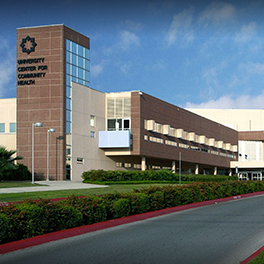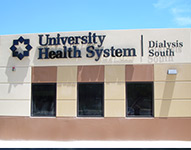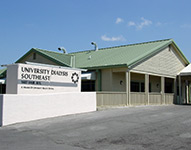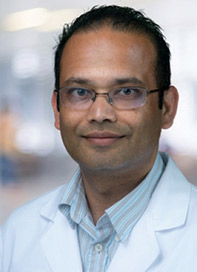No matter what type of kidney disease you have, nephrologists at University Health treat it – from kidney stones to kidney failure. Any condition, any age – both adults and children. And we provide care where you need it – in the hospital, in the clinic, in a dialysis center or at home.
University Health nephrologists provide general nephrology inpatient and outpatient kidney care as well as specialized clinics and services including the following:
This comprehensive program at University Hospital is for children and adolescents with elevated blood pressure, including hypertension caused by chronic kidney disease. Services include evaluation, testing, nutritional counseling and medication management.
As needed, you may be referred to one of our specialists in:
You may need dialysis if your kidneys aren’t removing enough wastes and fluids from your blood. You may need dialysis for a short time, until your kidney function improves. If you have progressive chronic kidney disease that is leading to kidney failure, you need dialysis for the rest of your life or until you receive a kidney transplant.
University Health provides dialysis care including:
Hemodialysis
Hemodialysis cleans your blood with a dialysis machine and filter called an artificial kidney. Usually, your doctor makes an entrance point in your arm or leg in a minor surgical procedure. You’re hooked up to the dialysis machine, and your blood is circulated through it and cleaned. On average, this treatment is given three times a week in four-hour sessions. Hemodialysis is provided in the hospital or in one of our four dialysis clinics in the San Antonio community. We offer flexible scheduling for your convenience.
Peritoneal Dialysis
Peritoneal dialysis cleans your blood inside your body without circulating it outside your body. You have peritoneal dialysis at home if your doctor decides you’re a good candidate for it.
Your doctor makes an entrance point for a catheter (plastic tube) in your abdomen in a minor surgical procedure. Each time you perform dialysis, you slowly fill your abdominal area with a solution through the catheter, and extra fluid and waste products are drawn out of your blood and into the solution.
One type of peritoneal dialysis – continuous ambulatory peritoneal dialysis (CAPD) – doesn’t involve a machine. You add the solution (dialysate) through the opening in your abdomen through a catheter four to five times a day. You can go about your usual activities while the dialysis takes place.
Another type of peritoneal dialysis – continuous cycling peritoneal dialysis (CCPD) – uses a machine to perform dialysis while you sleep.
Continuous Renal Replacement Therapy (CRRT)
Continuous renal replacement therapy is hemofiltration provided in the intensive care setting for acute kidney problems.
Pre-Transplant Care
University Health Transplant Institute provides testing to determine if you are a candidate for a kidney transplant. Once you’re on the transplant list, you must follow specific guidelines to make sure you’re ready for your transplant at a moment’s notice. Our pre-transplant coordinator works closely with you in this process. Wait times for a transplant are three to five years.
Kidney Transplant Surgery
We offer living donor and deceased donor kidney transplantation for adults and children.
If you are a kidney transplant candidate, you may have a willing donor who is not a match to you. In a paired exchange, your donor can donate a kidney to someone else who also has a donor who is not a match for that person but is a match for you. Our nephrologists test donors to determine matches. The transplant surgery is performed at University Hospital.
Post-Transplant Care
After your kidney transplant, we monitor you closely and evaluate your progress.
We follow transplant patients very closely during the first year after transplant and then annually. Our follow-up care is thorough. We want to make sure you keep your new kidney and remain in good health. This requires follow-up care and frequent lab tests to make sure everything is as it should be. We have the best patient survival rates in South Texas because of this attentive care.
Your Post-Transplant Coordinator
Your post-transplant coordinator remains in close contact with you and communicates with your doctor to adjust your medications as needed to avoid rejection of your new kidney. For the rest of your life, it’s our mission to monitor your condition to ensure the success of your transplant.
Convenient Locations, Less Travel
We provide outreach post-transplant care at other locations in South Texas – Corpus Christi, El Paso, Laredo and Eagle Pass/Del Rio – for your convenience and well-being.
Our doctors also share our post-transplant care guidelines with your local doctor to help make sure you get the care you need with as little travel required as possible. We work together to manage your post-transplant care.




